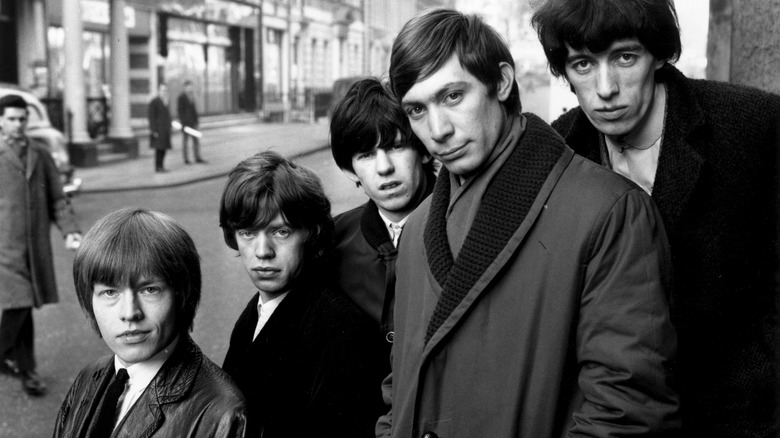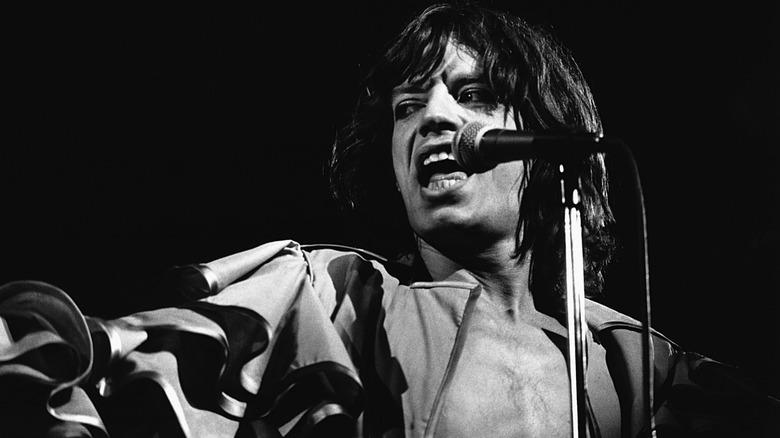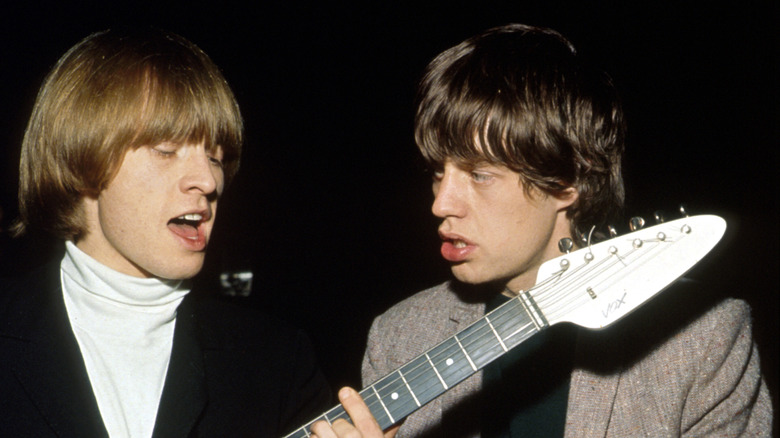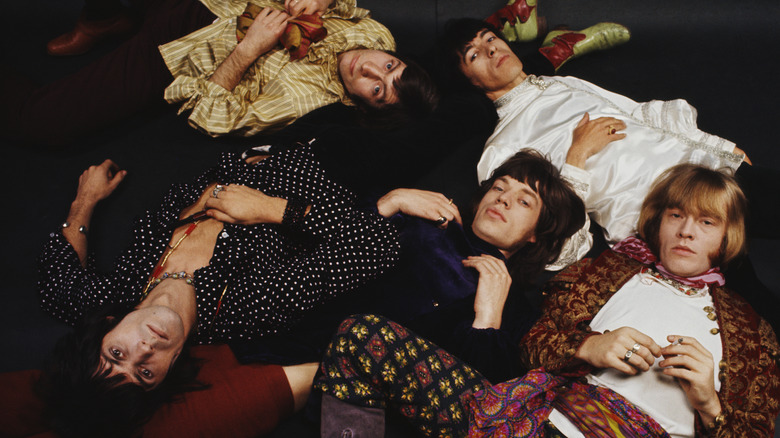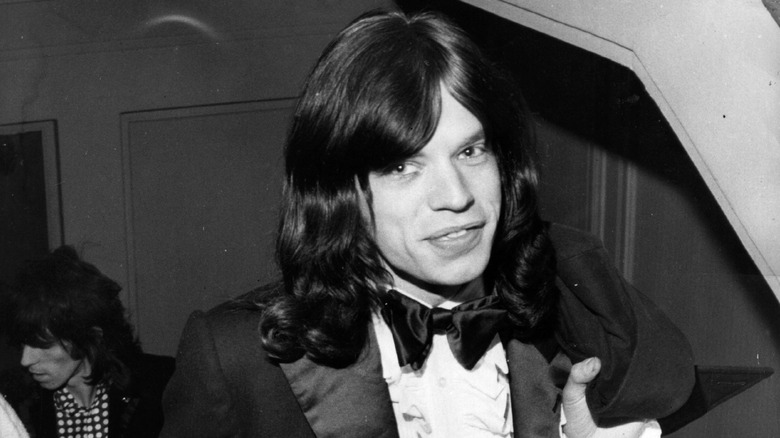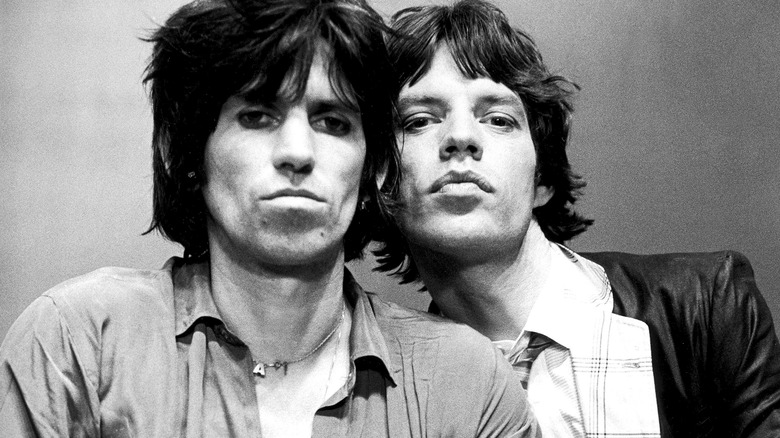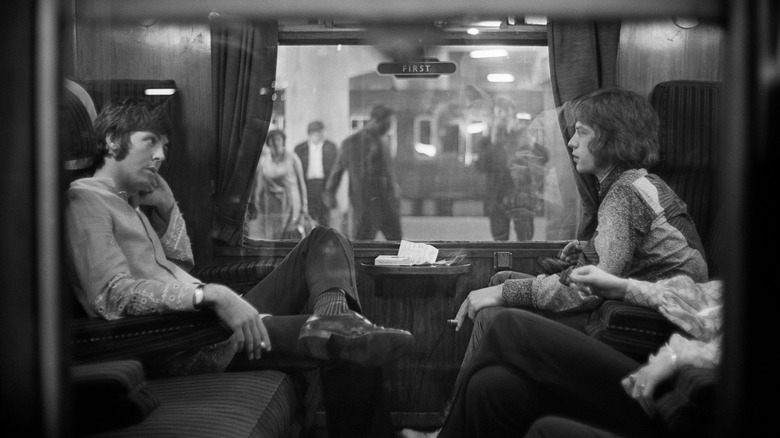Why There Will Never Be Another Rock Star Like Mick Jagger
When it comes to music, there's a British saying that's pretty appropriate here: We're spoiled for choice. Spotify alone boasts more than 100 million songs, so rising to the top takes an almost supernatural combination of luck and talent. Even the biggest stars of the 21st century are one among hundreds — if not thousands — and you could argue that it's the rock stars of the previous decades that really stand out among the crowd. Few of those have had the longevity and success that Rolling Stones frontman Mick Jagger has had, and his decades-long career is one that we're unlikely to see anyone repeat.
When the Stones released "Hackney Diamonds" in 2023, it was to major fanfare, chart-topping domination, and sadness: Missing from most of the album was longtime drummer Charlie Watts, who had died in 2021. Band members come and go, but the fact that the Stones' lineup has been pretty consistent for decades made this a loss that fans felt alongside Jagger.
Jagger was a wildly respectable 80 years old at the time of the album's release, so it's not surprising that it was a time of some serious introspection. That's unusual for him: In an interview with The Times, Jagger repeatedly condemned what he referred to as "nostalgia bollocks," but also revealed what legacy he hoped to leave behind: "The only thing I want the Stones to be remembered for is being a good rock band," he said. Modest? Incredibly — so let's talk about why there will never be another Jagger.
Just by the numbers, Mick Jagger is unlikely to be surpassed
Let's talk numbers here, because knowing that Mick Jagger has had an incredible career doesn't really put things into the proper perspective. Jagger was born in 1943, picked up his first guitar when he was 14, had the general idea of the Stones cemented by the early 1960s, and after entering the charts in 1963, he didn't stop. The Stones' 2024 tour was the 48th for the band, and over the course of six decades, they've played more than 2,000 concerts.
Famously, there are a lot of musicians who came to hate their most famous songs. Jagger, however, has always been cognizant of crowd favorites and hasn't shied away from playing what fans want to hear. That's led to "Jumpin' Jack Flash," "Brown Sugar," "Honky Tonk Women," and "Tumbling Dice" all being performed more than 1,100 times in concert, and let's be honest: It's the classics that keep people coming back.
The Stones also hold several spots on the list of largest concerts ever, with 1969's Hyde Park show hosting between 250,000 to half a million people, and 2006's Rio De Janeiro show being performed before about 1.5 million people. Finally, footage of Jagger's concert rehearsals was released in 2023, and if you're wondering how he's still got all that lithe energy at 80, consider this: At each concert, it's estimated that he covers about 12 miles.
He's spoken of entertaining as a post-Edwardian skill
Mick Jagger has always been lauded for his skill as an entertainer: A Rolling Stones concert is a whole experience that transcends the music alone. As it turns out, Jagger's pre-internet, pre-social media, and pre-TikTok upbringing likely contributed to his realization that he had a knack for the kind of showmanship that helped make the Stones a band known for its live performances.
In a 1995 Rolling Stone interview with Jann S. Wenner, Jagger was asked when he knew that he had this unique ability to connect with a massive audience. He said that when he was just starting to play in clubs, he saw the excitement. He chalked that up to two things: First, he knew blues and rock had an ability to connect with people. He, however, was channeling it in a way that we're unlikely to see people tapping into in the future.
He also explained that, aside from the music itself, "... there's this other thing that's performing, which is something that children have or they haven't got. In the slightly post-Edwardian, pre-television days, everybody had to do a turn at family gatherings. You might recite poetry, and Uncle Whatever would play the piano and sing, and you all had something to do. And I was just one of those kids [who loved it]. ... You want to have some sort of approval. But it's also just for the love of actually doing it. Fun."
The first song Mick Jagger and Keith Richards wrote was wildly popular
Creativity can come and go in waves, and there's something to be said for taking the time to hone a craft. The songwriting team of Mick Jagger and Keith Richards has been staggeringly successful and incredibly long-lived, and interestingly, the first complete song that they wrote, well, they kind of knocked it out of the park.
After getting their start with mostly blues covers, the duo wrote the absolutely iconic "As Tears Go By." It was initially destined only for Marianne Faithfull, who entered the charts with it in 1964. However, the Rolling Stones circled back on the song after releasing other hits that had a harder rock n' roll vibe, including "Get Off Of My Cloud."
That's when an interesting thing happened. The Stones could have become known for being a hard-rocking blues band, but when the thoughtful, introspective song was released on "December's Children (And Everybody's)," it proved that it had range and soul. In later interviews (via UDiscoverMusic), Jagger said, "It's a very melancholy song for a 21-year-old to write. The evening of the day, watching children play — it's very dumb and naive, but it's got a very sad sort of thing about it. Almost like an older person might write. ... It's a relatively mature song considering the rest of the output at the time."
Less-than-perfect conditions allowed Jagger to spearhead the perfect debut album
Technology today allows for recordings to be almost infinitely doctored, to be autotuned and tinkered with until they're deemed perfect. When Mick Jagger and the Rolling Stones cut their first album, they didn't have that technology, nor the budget for retakes. Or the budget for a high-end studio, for that matter.
The Stones' first album was recorded in just four days at the Regent Sound studio, and to say it wasn't packed with top-of-the-line equipment is kind of an understatement. The soundproofing material was egg cartons, and the instrument often referred to as maracas? That was a coin in a bottle that had just been emptied of its cognac. It was all bare bones, and it absolutely worked.
What made it onto that recording was raw energy and talent that captured what the Stones really was, not a carefully-doctored image. Richards later reflected that it was shocking how incredible he still found that first album, and that old saying about how necessity is the mother of invention? It could be argued that it kick-started the Stones' use of lo-fi equipment to create that raw, rugged sound that still just hits differently than polished studio perfection.
Jagger (and the Stones) took blues mainstream
When a very young Mick Jagger started talking to a very young Keith Richards, they connected over a shared passion for rhythm and blues music. It seems unthinkable in a world connected by social media and the internet that anything could be out of reach, but at the time, blues records weren't commonplace. In an interview with Rolling Stone, Jagger recalled chatting with Richards at a train station over the records and the sound that would define their career.
When things started to coalesce into the Rolling Stones, Jagger made it clear that it wasn't a rock band. Popular opinion might have said differently, but the fact remains that not only did Jagger and Richards gel because of a shared passion for little-known music, but they were also able to spearhead the introduction of blues to the U.K.
It's possible to argue that pre-Stones, blues was a niche thing. That changed: The Stones took its band name from a Muddy Waters song, its covers entered the charts, and not only was its original stuff heavily influenced by the sounds the bandmembers loved as kids, but later albums — like "Blue & Lonesome," released in 2016 — paid homage to the greats that had come before them. Interestingly, questions of cultural appropriation were quickly kicked to the curb: Jagger and the Stones have always made it clear that they weren't just covering the original blues artists, they were championing them and pointing fans toward learning about the genre's roots.
He faced an uphill battle, as rock music was once for very low-class people
Today, there's something undeniably cool about musicians, whether you're talking about the high school kids and their garage band or Taylor Swift. At the time Mick Jagger was coming into his own and deciding to give this whole music business a try, it wasn't to step into that role of guaranteed cool guy. In a 1995 interview with Rolling Stone, Jagger shared that for him, it was kind of the opposite.
He recalled being a 15-year-old kid just learning to entertain: "I used to play Saturday night shows with all these different little groups," he said. "... And my parents were extremely disapproving of it all. Because it was just not done. This was for very low-class people, remember. Rock and roll singers weren't educated people."
Later, Jagger was studying at the London School of Economics alongside toying with the idea of a career in music, and we all know which won. It wasn't always an easy choice, though, as he's also been candid about the fact that his father was very vocal in his disapproval. He told The Times, "My dad had an idea for me, but his idea was not what I wanted to do."
Jagger knew and appreciated the importance of a great guitar riff
The rock and roll genre has gone through a number of transformations, so it's easy to forget that at the time the Rolling Stones were putting out its first singles and albums, it was creating something that had simply never been heard. It's pretty wild to think about the talent that's needed to pluck something original out of the air, and in an interview with Rolling Stone, Mick Jagger spoke a bit about how their originality helped catapult them into the stratosphere.
One of the songs that got a mention was "Tell Me (You're Coming Back)," which he noted was a pop song that was released at a time that was dominated by R&B. Of course, there's also "(Can't Get No) Satisfaction," and Jagger explained what made it a hit: "It has a very catchy title. It has a very catchy guitar riff. It has a great guitar sound, which was original at that time. And it captures a spirit of the times, which is very important in those kind of songs."
Jagger is also very ready and willing to give credit where credit is due, and acknowledged Brian Jones as a natural musician who helped create something new and gave the Stones its sound. "He played the slide guitar at a time when no one really played it," Jagger said, adding, "... he had this very lyrical touch." Jones, he confirmed, had helped them change the era's musical landscape.
His ideas of leadership and partnership were brilliantly suited to longevity and weathering the storms
Ask anyone who the leader of the Rolling Stones is, and it's clearly going to be Mick Jagger. Jagger, however, has shared some interesting thoughts on leadership and success that are perhaps less often observed than they should be.
In an interview with Rolling Stone, Jagger compared his leadership of the Stones and partnership with Keith Richards to what was going on with John Lennon, Paul McCartney, and The Beatles. Lennon and McCartney, he said, both wanted to be the boss, and "seemed to be very competitive over leadership of the band." That famously didn't work, and Jagger saw things differently: "The thing in leadership is, you can have times when one person is more at the center than the other, ... So you sort of agree what your roles are."
Jagger went on to say that Brian Jones had a mentality similar to that of Lennon and McCartney, and tensions built when the strong personalities of the others kept Jones from rising to the top. Add in the jealousy that Jagger got as frontman, and things just kind of imploded. But Jagger's take on leadership is wonderfully practical: "You have to realize that everyone in a band is all more or less together, and everyone has their own niche, and some people lead in some ways, and some people lead in others." Does that work? A decades-long career with a stable band roster kind of says it all.
His voice is both distinctive and natural
One of the biggest reasons that the world is never going to see another Mick Jagger is simply because of his voice. There's no one that's ever been mistaken for Jagger, and as soon as he starts singing, there's no question that it's him. In a "Voodoo Lounge"-era interview with Hot Press, Jagger spoke a bit about how the personality behind a voice could be more important than technical perfection.
"You can have a great, great voice technically but, if there's a certain timbre of it that people don't recognize or don't like, that annoys people. But if you put enough energy into the delivery, it doesn't matter if you don't have such a fantastically technical voice." He went on to say that it's a distinctiveness that you're born with, and can't really teach.
There have been plenty of not-so-kind things that have been said about Jagger's voice over the years, and early rejections occasionally came from record executives suggesting that if the band wanted a career, it should replace him. But there's something else going on with Jagger's voice that sets him apart: Listen to songs from the '60s and then listen to "Hackney Diamonds," and while the voice isn't quite the same, it's still 100% recognizable, distinct, and perfectly preserves his own charismatic style in a way that many musicians can only dream of as they age. Voices usually change, break, or weaken, but Jagger remains Jagger.
Jagger saw the Stones through tragedies that would have destroyed other bands
Rock music is filled with cautionary tales. Some bands faced tragedy and were forever changed by it, many break up long before fans are ready to let them go, and legendary songs are left unfinished. That makes it all that much more impressive that Mick Jagger has managed to keep the core members of the Stones together through some shocking tragedies that go all the way back to Brian Jones's 1969 death.
Parting-of-ways aside, a previously scheduled concert in Hyde Park turned into a tribute concert, held two days after Jones was found dead at his home. Jagger opened the show by reciting Percy Bysshe Shelley's "Adonais," and the band would keep his memory alive in tribute songs that included "Shine A Light" from "Exile on Main St."
Just weeks into the next year, the Stones was dealt another potentially band-breaking tragedy when four people died at the still-notorious concert at Altamont. Jagger spoke with Rolling Stone in 1987 about how devastated they were, and noted that it led to a realization of how important it was that they control every aspect of every show. Finally, there was the 2021 death of Charlie Watts. Two years later, Jagger told The Guardian, "I still think about Charlie a lot ... I think about him when I'm playing, and what he would have played ... I hate to say this: as you get older, a lot of your friends die. That starts in your 20s."
It was Mick Jagger who came up with the most iconic band logo in music history
Not even The Beatles had imagery associated with it on the level of the Stones' tongue-and-lips logo, which the band commissioned from an arts student named John Pasche. It was Pasche's second attempt at the design that worked, and part of the reasoning behind the design was that Mick Jagger wanted something simple, distinct, and unmistakable.
It's gone through a few different incarnations — including a black version that was used after the death of Charlie Watts — and although it's not clear just how much money the logo has helped make the band, it's suspected that the number is in the hundreds of millions of dollars. (Pasche sold the Stones the copyright back in 1982.) It was a pretty brilliant idea, and while Jagger did come up with it, those lips aren't meant to be his at all.
So, where did the logo come from? Jagger told The Times of India that about the same time he had the idea for a logo kicking around, his brother gave him a book that included images of the goddess Kali. "I saw this image of a disembodied tongue of Kali. I thought it would be an inspiration," he explained, and he was right.
The Stones hit at a time when everyone was rethinking music
There are a lot of groundbreaking musicians who are considered to have been ahead of their time, and in some cases, that means disappearing into complete obscurity. The opposite happened to Mick Jagger and the Rolling Stones, and in an interview with Hot Press, Jagger explained that it was in large part because they were in the right place at the right time.
In the 21st century, fandoms are the norm. That's actually a fairly recent idea, and according to Jagger, that shift happened just in time for the world to notice they were doing something completely innovative. Before, he explained, it was "people having their own little fashions and their own grooves — popular culture just burgeoning on its own." When The Beatles and the Stones hit, journalists started looking at pop culture phenomena as something worth reporting, turning things that might have previously been pretty niche into something global.
Another interview in Rolling Stone went a step farther, explaining that the bad-boy image of the Stones didn't fade away as so many pop culture phenomena do because it perfectly meshed with the mindset of the time. The 1960s was a period of protests, rioting, social change, and wars that people didn't want to fight, and even though Jagger has repeatedly said that they never condone violence, they were uniquely poised to become voices that captured the feel of a decade.
A gifted book kick-started an interest in the occult and shaped heavy metal
Mick Jagger and the Rolling Stones were often associated with some pretty dark stuff: "Sympathy For The Devil" was a massive hit, the album cover for "Beggars Banquet" featured occult symbols, and of course, there was 1967's "Their Satanic Majesties Request." It's this particular body of work that's often credited as kicking off the entire aesthetic associated with heavy metal, and it might not have happened if it weren't for a book.
The book was Mikhail Bulgakov's "The Master and Margarita." Jagger's copy was a gift from Marianne Faithfull, and it's been widely reported that it spawned not only an obsession with the occult and Satanism, but the aforementioned section of the Stones' catalogue.
To put things in context, the albums and the songs were released in the years prior to the tragedy at Altamont, which only seemed to cement the Stones as the mirror image of the peace-loving Beatles. In a 1995 interview with Rolling Stone, Jagger went on record to try to clear some things up, and it started with a question about whether or not Altamont made them rethink their association with the satanic. "The Satanic-imagery stuff was very overplayed [by journalists]. We didn't want to really go down that road. And I felt ["Sympathy For the Devil"] was enough. You didn't want to make a career out of it." The cat, however, was already out of the bag.
Mick Jagger (and Keith Richards) changed ideas about what songs could be written about
It's kind of understood these days that songs can be about anything and everything. Sure, there are always themes of love and loss, but Toby Keith also had a wildly popular song about red Solo cups. It's possible to argue that wide acceptance came thanks to the Mick Jagger-Keith Richards songwriting partnership.
In a 1987 interview with Rolling Stone, Jagger was asked whether or not the Stones had intended to send powerful messages advocating for things like social change. He said that they really hadn't, but he did note that songs like "Mother's Little Helper" had another impact.
He explained that, going back to the previous decade and even early in their own career, song subject matter was limited. Jagger said: "Perhaps what we did in this period was to enlarge the subject material of popular music to include topics outside the typical 'moon in June/I've got a new motorbike' teenage genre. We said you can write a song about anything you want. And that was a really big thing — it's certainly one of the big legacies in the songwriting area that we left, along with other artists." In another Rolling Stone interview a few years later, he noted that they had taken songs from cliche to deeply personal. When it was suggested that it was "somewhat daring," Jagger had a great response: "I don't know if it was daring. It just hadn't been done."
Even Jagger's rejected songs were chart-topping winners
Every Rolling Stones fan has a favorite album or few, and many will probably say that "Tattoo You" is one of the standouts. That album is also great proof of the sheer talent that Mick Jagger and the rest of the Stones have, because it was largely made up of songs that were rejected from earlier albums.
The genesis of "Tattoo You" is a weird story. Jagger and Keith Richards have had a famously sibling-like relationship, managing to care deeply for each other and occasionally hate each other at the same time. It was 1981, they were in one of their feuding periods, and the band's management was desperate for material for an album. New stuff wasn't forthcoming, so Chris Kimsey — one of the most prolific engineers of the era — started sifting through material that had been previously left on the cutting room floor. The tracks that eventually made it onto "Tattoo You" came from bits and pieces of songs that had been recorded for "Black & Blue," "Some Girls," "Emotional Rescue," and "Goat's Head Soup," and final versions were largely finished by Jagger and assembled by Kimsey.
Should it have worked? Probably not, but it did — and that's a testament to the kind of talent that only comes along once in a very great while. (It also makes "Waiting On A Friend" incredibly poignant.)
Jagger spearheaded a shocking number of collaborations with serious talent
Competition might be the name of the game these days, when it seems like everyone wants the spotlight to themselves. More people might consider taking a page from Mick Jagger's books, as his willingness to share that spotlight has resulted in some epic collaborations, which started with the hilariously epic and only mildly cheesy "Dancing in the Street" collaboration with David Bowie, way back in 1985.
He's also recorded alongside Tina Turner, Dave Grohl, and, perhaps most infamously, he sang backup vocals on one of the most mysterious songs in rock history: Carly Simon's 1972 hit "You're So Vain." (Simon has been famously secretive about who the song is about, but she has said that it's not Jagger.) He's teamed up with Peter Tosh, Muddy Waters, Eric Clapton, Bono, Pete Townshend, Lenny Kravitz; the list goes on and on.
Jagger also hasn't been afraid to step in when he's not the first choice: In 1984, The Jacksons released "State of Shock," with a Jagger-Michael Jackson duet. The first choice? Freddie Mercury.
Rather than cementing a rivalry with The Beatles, they collaborated
There are a ton of musicians' feuds that have gotten wildly out of hand, and it kind of makes sense. It's an industry filled with creative people, strong personalities, and a lot of competition, after all. Ask anyone about the biggest rivals from the 1960s and you're likely to hear the Rolling Stones versus The Beatles put forward as a suggestion, but Mick Jagger has said that wasn't the case.
In an interview in Rolling Stone, Jagger said the difference was that the Stones debuted as hailing from the south of England, as opposed to the northern Beatles. He explained that he had shared a certain amount of kinship with John Lennon in particular, saying, "We all had a good relationship with John. He seemed to be in sympathy with our kind of music, so we used to go out to clubs a lot. We did a lot of hanging out. ... He was educated and very smart and cynical and funny and really amusing company." When asked about Lennon's death, he added, "I just felt very sad for the loss of someone that I loved very much."
The various members of the Stones and The Beatles collaborated musically, too. That includes sharing songs — like "I Wanna Be Your Man" — to singing backup for each other. Jagger and Keith Richards are both in "All You Need Is Love," for example, and Ronnie Wood shares some co-writing credits with George Harrison.
Mick Jagger's thoughts on staying relevant focus on uniqueness and work
If you're of the mindset that all modern music sounds the same, that's not just the opinion of someone who likes yelling at kids to get off their lawn. Results of a 2015 study by the Medical University of Vienna (via Mic) found that in the most recent years, music — from vocals to instrumental organizations — has been getting more formulaic and less complex. The idea was that people like things that they're familiar with, and familiar-sounding music will be more popular and sell better.
Add in the fact that sampling older songs for new compositions is becoming increasingly popular, and it is becoming more and more unlikely that the next genre-breaking incarnation of Mick Jagger is going to step up. Ironically, it was also in 2015 that Jagger spoke to CMuse and gave the next generations his advice on how to stay relevant: Find your creativity and your uniqueness.
"... you got to bring a sense of uniqueness to every show you do, and ... to yourself, it's always got something different and special about it." That's not an easy thing, but it's one that seems to be second nature for Jagger. He's regularly lauded as being one of the hardest-working people in the industry, and is well-known for overseeing the creation of songs from start to finish. Why? So everyone's contributions are heard, loud and clear.
Jagger's influence has spanned all genres
When established musicians branch out from the genre they're known for, it can be pretty controversial. There's perhaps no better example of that than Beyoncé's "Cowboy Carter," which raised all kinds of questions about promotions, award-show snubs, and what defines an album's genre. That's a criticism that Mick Jagger seems to have escaped — or at least, successfully ignored — particularly with solo projects.
But that applies to the Rolling Stones, too. Most people will say that it's definitely a blues-inspired rock band, but it also has some seriously outstanding country songs that blend so seamlessly into its repertoire that many might not even think of "Wild Horses," "Dead Flowers," "Far Away Eyes," and "Sweet Virginia" as country songs, but they are.
On the flip side, Jagger has also proclaimed some serious admiration for none other than Machine Gun Kelly and Yungblud. In a 2022 interview (via The Independent), he noted those were the two artists that "makes me think there is still a bit of life in rock and roll," and that's some seriously high praise. Crossing genres can be difficult, and no one does it quite like Jagger.
The Stones' longevity has given Jagger a unique perspective on time and aging through music
Mick Jagger turned 80 in 2023, an impressive feat for a top-tier artist, especially given the long list of actors and musicians who eerily died at 27. Look at the list of musicians who died at 30, and it becomes even more incredible that Mick Jagger has not only been performing for a whopping six decades, but has also continued doing so with the same energy he took to the stage with in the 1960s and '70s.
Way back in 1994 — when he was still in his 50s — interviews like one with Hot Press were already addressing the abnormal longevity of the Rolling Stones. Even then, Jagger noted that having spent so many years performing with the same people gave them something unique: "Intuition's just another word for a lot of experience that's stored, and then you don't have to intellectualize it anymore."
Andrew Watt produced "Hackney Diamonds," and in an interview with The Guardian he spoke a bit about watching the magic happen. The Mick Jagger that concert-goers saw on stage was the same Jagger that was in the studio, and he described the chemistry between Jagger, Keith Ricards, and Ronnie Wood — along with Watts' replacement, Steve Jordan — in a poignantly beautiful way: "The great thing about the Stones is how loose they are, how they speed up and slow down, their internal heartbeat together." Will the world see that again? Probably not.




